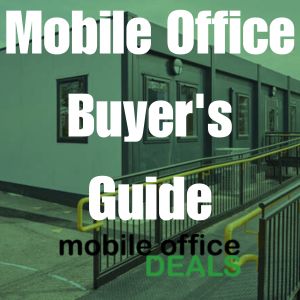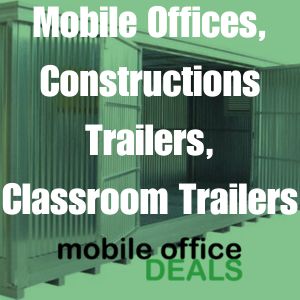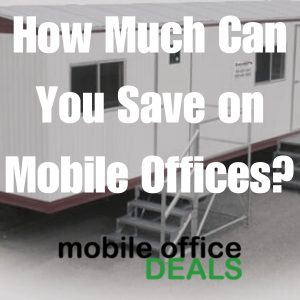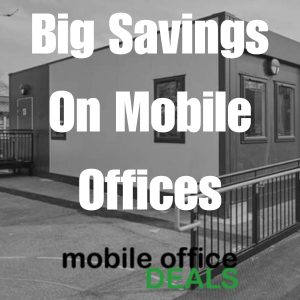
Tips for Selecting the Right Mobile Office Trailer for Your Construction Project
When it comes to managing a construction project, having the right workspace is crucial. Mobile office trailers offer a flexible and efficient solution for on-site management, but selecting the right one can be challenging. Here are some key considerations to help you choose the perfect mobile office trailer for your construction project.
Assess Your Space Requirements
When it comes to choosing a mobile office trailer for a construction project, understanding and assessing your space requirements is critical. Here’s a deeper look into how to evaluate the space you need and what mobile office trailers typically offer.
Understanding Average Space in Mobile Office Trailers
Mobile office trailers come in various sizes, typically ranging from as small as 150 square feet to over 1,000 square feet. The size you need depends on several factors:
- Number of Staff: A fundamental determinant of space requirement is the number of people who will be working inside the trailer. As a general rule, plan for about 100-150 square feet per person to ensure a comfortable working environment.
- Purpose of the Space: Consider the activities that will take place inside the trailer. Will it be used just for administrative work, or will it also serve as a meeting place, break room, or storage area? Different activities require different amounts of space.
- Furniture and Equipment: Account for the space needed for desks, chairs, filing cabinets, and any specialized equipment that might be necessary for your operations.
Assessing Your Specific Space Needs
To accurately assess how much space you’ll need in a mobile office trailer, follow these steps:
1. Make a List of Essential Functions: Identify what functions the office trailer must serve. For instance, if the trailer needs to accommodate project management staff, on-site meetings, and blueprint storage, each of these will require specific space allocations.
2. Consider Work Style and Flow: Think about how your team works. Do they need individual desks, or would a communal working area suffice? How much space is needed for employees to move comfortably around the office?
3. Plan for Storage: Construction projects often come with a lot of paperwork and materials that need storing. Consider the amount and type of storage that will be necessary, such as file cabinets, shelves, or lockers.
4. Factor in Additional Amenities: Amenities such as a small kitchenette, a restroom, or a lounge area can significantly enhance comfort and efficiency but also require additional space.

Utilizing Space Efficiently
Once you understand your space requirements, the next step is to utilize this space efficiently:
- Opt for Space-Saving Furniture: Choose furniture that maximizes space, such as foldable desks or chairs and compact storage solutions.
- Smart Layout Planning: Design the interior layout to maximize the use of available space. This may involve consulting with a specialist who can help design a floor plan that meets your needs.
- Vertical Space Usage: Don’t forget about vertical space. Using wall-mounted shelves and hooks can free up floor space while keeping essential tools and documents accessible.
- Multi-functional Areas: Create areas that can serve multiple purposes. For example, a meeting area can double as a dining space during breaks.
Determine the Necessary Amenities
When equipping a mobile office trailer for a construction site, the right amenities can make all the difference in functionality and comfort. Here’s a look at the essential amenities you should consider for an optimal on-site office environment.
Basic Utilities: A Foundation for Functionality
Utility setup is fundamental in a mobile office trailer. Ensuring access to electricity is the first step, as it powers lighting, climate control systems, and electronic equipment. Additionally, if your trailer will house a small kitchenette or a restroom, plumbing becomes a necessity. Water supply and sewage disposal options should be explored, whether through connection to local utilities or self-contained systems.
Connectivity: Keeping the Lines of Communication Open
In today’s digital world, staying connected is crucial. Ensuring reliable internet access in your mobile office trailer is a must for efficient project management. This could mean installing Wi-Fi routers or ensuring strong cellular service for hotspot connectivity. Also, consider the need for telephone lines, especially in areas where cell service might be unreliable.
Climate Control: Comfort in All Conditions
The comfort of your team is vital for productivity. Heating and air conditioning systems are essential, particularly in regions with extreme temperatures. Proper insulation also plays a role in maintaining a comfortable internal environment and can be a key factor in energy efficiency.
Security Measures: Protecting Your Assets
On a construction site, security is paramount. Equipping your mobile office trailer with sturdy locks, security bars on windows, or an alarm system can deter theft and vandalism. In some cases, investing in a surveillance system with cameras can provide additional peace of mind.
Ergonomic and Functional Furniture
Furnishing your mobile office thoughtfully can significantly impact comfort and efficiency. Ergonomic chairs and desks support the well-being of the team, reducing strain from long hours of work. Space-saving furniture, like foldable or multi-purpose pieces, can also help in maximizing the limited space.
Lighting: A Bright and Productive Environment
Good lighting is essential for creating a work-friendly environment. Opt for LED lighting fixtures that provide bright, energy-efficient illumination. Natural light can also play a role in enhancing the workspace, so consider the placement of windows during the setup.
Kitchenette and Restroom Facilities
For longer projects, having a kitchenette and restroom in your mobile office trailer can greatly increase convenience. A small fridge, microwave, coffee maker, and a clean restroom facility can reduce the need to leave the site for breaks, saving time and maintaining focus.
Customization to Fit Your Needs
Finally, remember that every construction project is unique, and your mobile office trailer should reflect your specific needs. Customization options like extra storage, specialized workspace areas, or enhanced communication systems can be incorporated to create an environment that truly supports your project’s objectives.

Consider the Duration and Location of the Project
Selecting the right mobile office trailer isn’t just about the size and amenities; it also significantly depends on the specific duration and location of your construction project. These factors can influence the type of trailer you need, its setup, and the overall logistics involved.
Duration of the Project: Short-Term vs. Long-Term Needs
- Short-Term Projects: For projects lasting a few weeks to a few months, simplicity and functionality should be the priorities. A basic, no-frills trailer might suffice, focusing on essential amenities and ease of setup and removal.
- Long-Term Projects: For projects extending over several months or even years, comfort and durability become more important. You might opt for a trailer with more comprehensive amenities, like better insulation, robust climate control, and ergonomic furniture, to ensure comfort over extended periods.
Location Considerations: Terrain and Accessibility
- Terrain: The physical landscape of your construction site plays a critical role in the type of mobile office trailer suitable for your needs. For rugged or uneven terrain, a trailer with a more durable construction and appropriate anchoring systems is necessary. In contrast, for urban or developed sites, accessibility might be less of an issue.
- Accessibility: Consider the ease of transporting the trailer to your site. Factors like road access, the presence of obstructions, and the distance from main roads can impact the type and size of the trailer you choose. Additionally, ensure that the delivery and setup process can be executed smoothly in your chosen location.
Environmental Factors: Weather and Site Conditions
Weather Conditions: The local climate is a crucial factor. In areas with extreme temperatures, heavy rainfall, or strong winds, a sturdier trailer with efficient heating, cooling, and waterproofing might be required to withstand the elements.
Site-Specific Conditions: Each construction site has its unique characteristics – dust levels, moisture, the potential for mud, etc. Your trailer should be equipped to handle these conditions without compromising its functionality or the comfort of your team.
Compliance and Regulations
Local Regulations: Be aware of any local zoning laws, building codes, or environmental regulations that could impact where and how you can set up your mobile office trailer. In some regions, specific rules may dictate the type of structures allowed on a construction site.
Environmental Compliance: If your project is in an area with strict environmental protection rules, consider a trailer with eco-friendly features like solar panels or energy-efficient appliances to minimize your environmental footprint.
Preparing for the Unexpected
Flexibility: Construction projects can often face unexpected changes. Choose a mobile office trailer that offers some level of flexibility to adapt to changing needs, whether it’s a sudden need to relocate the trailer or adjust its layout.

Evaluate Customization Options
Customizable Features: Some suppliers offer customization options for their trailers. Assess if you need any specific modifications like extra storage space, enhanced security features, or branding on the exterior.
Factor in Delivery and Setup
Delivery and Installation: Inquire about the delivery and installation process. Check if the supplier handles transportation and setup and if these services are included in the cost.
Budget and Cost-Effectiveness
When incorporating a mobile office trailer into your construction project, understanding its impact on your budget and the cost-effectiveness of this choice is crucial. This consideration will help you make an informed decision that aligns with your financial constraints while still meeting your project’s needs.
Assessing the Financial Implications
- Initial Investment vs. Long-Term Savings: While there’s an upfront cost associated with acquiring a mobile office trailer, whether through purchase or rent, it’s important to weigh this against the potential long-term savings. These savings can come in the form of reduced travel time to off-site offices, lower costs compared to constructing a permanent structure, and the benefits of on-site efficiency.
- Rental vs. Purchase: The decision to rent or buy a mobile office trailer should be based on the project’s duration and your company’s long-term needs. Renting can be more cost-effective for short-term projects or if you need flexibility, while purchasing may be more economical for long-term use across multiple projects.
Understanding Rental Agreements
If you opt to rent a mobile office trailer, it’s essential to thoroughly understand the rental agreement. Be clear on the terms regarding the rental period, maintenance responsibilities, any additional fees (such as delivery and setup), and the process for extending the rental term if needed.
Customization Costs
Customizing your mobile office trailer with specific features (like upgraded finishes, additional insulation, or technology integrations) will impact the cost. Tailor these customizations to what’s absolutely necessary for your project to manage expenses effectively.
Consider Resale Value
If purchasing, consider the resale value of the trailer. Well-maintained trailers, especially those with versatile layouts and features, can retain a significant portion of their value. This aspect could offset some of the initial purchase costs in the long term.
Operational Costs
Don’t overlook the operational costs associated with a mobile office trailer. This includes utilities, internet, security, and any ongoing maintenance. These recurring costs should be factored into your overall budget.
Evaluating Cost-Effectiveness
To truly gauge the cost-effectiveness of a mobile office trailer, consider the value it brings in terms of on-site productivity, the ability to manage the project more effectively, and the convenience it provides to your team. Improved project management can lead to cost savings in other areas of the project.
Negotiating with Suppliers
When renting or purchasing, don’t hesitate to negotiate with suppliers for better terms or discounts, especially if you’re planning a long-term rental or considering bulk purchases for multiple trailers.
Insurance and Liability
Ensure that your mobile office trailer is properly insured. This protects your investment and covers any liability in case of damage or accidents associated with the trailer.

Additional Features
- Security Features: Construction sites can be targets for theft. Opt for a trailer with sturdy locks, security bars on windows, or even a security system.
- Storage and Organization: Built-in shelves, filing cabinets, and closets can help keep your mobile office organized and efficient.
- Meeting and Break Areas: If you plan to hold meetings or provide space for breaks, ensure there’s an area in the trailer that can be dedicated to these purposes.
Selecting the right mobile office trailer is about balancing practicality with comfort. By carefully considering your project’s specific needs and the options available, you can ensure that your on-site operations run smoothly and efficiently. Remember, a well-chosen mobile office trailer is not just a workspace; it’s a hub for management, planning, and coordination that is crucial to the success of any construction project.
If you’re in the process of choosing a mobile office trailer for your next construction project and need expert advice or a quote, we’re prepared to assist you today. Our team at Mobile Office Deals is dedicated to helping you find the best solution that meets your unique project needs.
